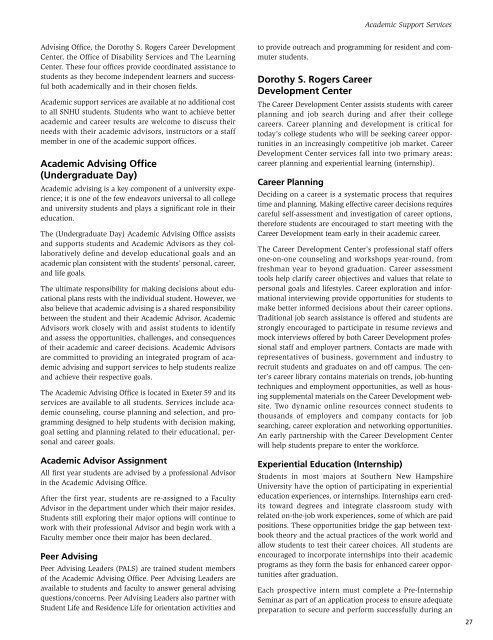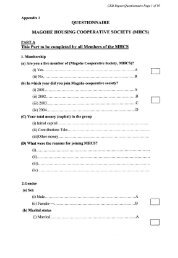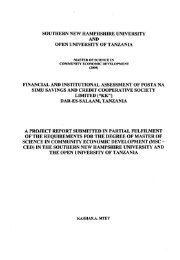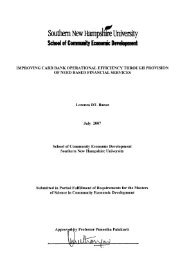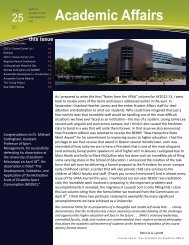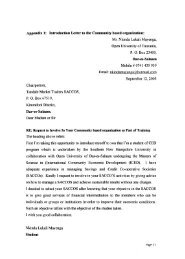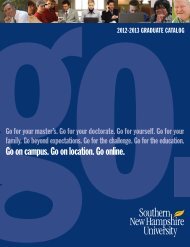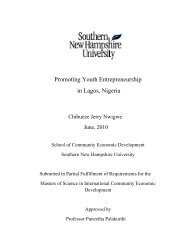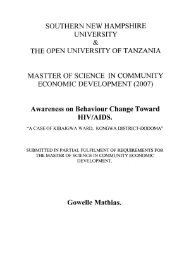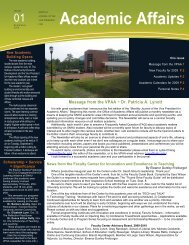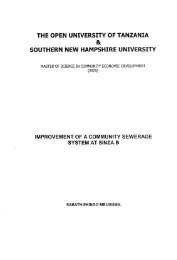Undergraduate Catalog 2010-2011 - SNHU Academic Archive ...
Undergraduate Catalog 2010-2011 - SNHU Academic Archive ...
Undergraduate Catalog 2010-2011 - SNHU Academic Archive ...
You also want an ePaper? Increase the reach of your titles
YUMPU automatically turns print PDFs into web optimized ePapers that Google loves.
<strong>Academic</strong> Support Services<br />
Advising Office, the Dorothy S. Rogers Career Development<br />
Center, the Office of Disability Services and The Learning<br />
Center. These four offices provide coordinated assistance to<br />
students as they become independent learners and successful<br />
both academically and in their chosen fields.<br />
<strong>Academic</strong> support services are available at no additional cost<br />
to all <strong>SNHU</strong> students. Students who want to achieve better<br />
academic and career results are welcome to discuss their<br />
needs with their academic advisors, instructors or a staff<br />
member in one of the academic support offices.<br />
<strong>Academic</strong> Advising Office<br />
(<strong>Undergraduate</strong> Day)<br />
<strong>Academic</strong> advising is a key component of a university experience;<br />
it is one of the few endeavors universal to all college<br />
and university students and plays a significant role in their<br />
education.<br />
The (<strong>Undergraduate</strong> Day) <strong>Academic</strong> Advising Office assists<br />
and supports students and <strong>Academic</strong> Advisors as they collaboratively<br />
define and develop educational goals and an<br />
academic plan consistent with the students’ personal, career,<br />
and life goals.<br />
The ultimate responsibility for making decisions about educational<br />
plans rests with the individual student. However, we<br />
also believe that academic advising is a shared responsibility<br />
between the student and their <strong>Academic</strong> Advisor. <strong>Academic</strong><br />
Advisors work closely with and assist students to identify<br />
and assess the opportunities, challenges, and consequences<br />
of their academic and career decisions. <strong>Academic</strong> Advisors<br />
are committed to providing an integrated program of academic<br />
advising and support services to help students realize<br />
and achieve their respective goals.<br />
The <strong>Academic</strong> Advising Office is located in Exeter 59 and its<br />
services are available to all students. Services include academic<br />
counseling, course planning and selection, and programming<br />
designed to help students with decision making,<br />
goal setting and planning related to their educational, personal<br />
and career goals.<br />
<strong>Academic</strong> Advisor Assignment<br />
All first year students are advised by a professional Advisor<br />
in the <strong>Academic</strong> Advising Office.<br />
After the first year, students are re-assigned to a Faculty<br />
Advisor in the department under which their major resides.<br />
Students still exploring their major options will continue to<br />
work with their professional Advisor and begin work with a<br />
Faculty member once their major has been declared.<br />
Peer Advising<br />
Peer Advising Leaders (PALS) are trained student members<br />
of the <strong>Academic</strong> Advising Office. Peer Advising Leaders are<br />
available to students and faculty to answer general advising<br />
questions/concerns. Peer Advising Leaders also partner with<br />
Student Life and Residence Life for orientation activities and<br />
to provide outreach and programming for resident and commuter<br />
students.<br />
Dorothy S. Rogers Career<br />
Development Center<br />
The Career Development Center assists students with career<br />
planning and job search during and after their college<br />
careers. Career planning and development is critical for<br />
today’s college students who will be seeking career opportunities<br />
in an increasingly competitive job market. Career<br />
Development Center services fall into two primary areas:<br />
career planning and experiential learning (internship).<br />
Career Planning<br />
Deciding on a career is a systematic process that requires<br />
time and planning. Making effective career decisions requires<br />
careful self-assessment and investigation of career options,<br />
therefore students are encouraged to start meeting with the<br />
Career Development team early in their academic career.<br />
The Career Development Center’s professional staff offers<br />
one-on-one counseling and workshops year-round, from<br />
freshman year to beyond graduation. Career assessment<br />
tools help clarify career objectives and values that relate to<br />
personal goals and lifestyles. Career exploration and informational<br />
interviewing provide opportunities for students to<br />
make better informed decisions about their career options.<br />
Traditional job search assistance is offered and students are<br />
strongly encouraged to participate in resume reviews and<br />
mock interviews offered by both Career Development professional<br />
staff and employer partners. Contacts are made with<br />
representatives of business, government and industry to<br />
recruit students and graduates on and off campus. The center’s<br />
career library contains materials on trends, job-hunting<br />
techniques and employment opportunities, as well as housing<br />
supplemental materials on the Career Development website.<br />
Two dynamic online resources connect students to<br />
thousands of employers and company contacts for job<br />
searching, career exploration and networking opportunities.<br />
An early partnership with the Career Development Center<br />
will help students prepare to enter the workforce.<br />
Experiential Education (Internship)<br />
Students in most majors at Southern New Hampshire<br />
University have the option of participating in experiential<br />
education experiences, or internships. Internships earn credits<br />
toward degrees and integrate classroom study with<br />
related on-the-job work experiences, some of which are paid<br />
positions. These opportunities bridge the gap between textbook<br />
theory and the actual practices of the work world and<br />
allow students to test their career choices. All students are<br />
encouraged to incorporate internships into their academic<br />
programs as they form the basis for enhanced career opportunities<br />
after graduation.<br />
Each prospective intern must complete a Pre-Internship<br />
Seminar as part of an application process to ensure adequate<br />
preparation to secure and perform successfully during an<br />
27


